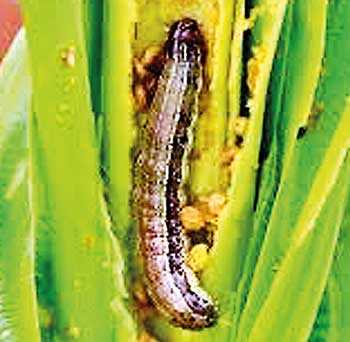Saturday Feb 21, 2026
Saturday Feb 21, 2026
Wednesday, 23 January 2019 00:45 - - {{hitsCtrl.values.hits}}
Over Rs. 300 million allocated for compensation and mitigation activities
Sirisena sets up Presidential Special Task Force to find urgent solutions
Dept. of Agriculture asks for assistance from FAO to bring in foreign experts
80 crops including paddy risk infection
The Government yesterday announced a host of new measures to intensify the battle against the Fall Armyworm (Spodoptera frugiperda) attacking maize cultivations in the country, to mitigate any possibility of it spreading to other crops, allocating funds of over Rs. 300 million for compensation and mitigation activities.
The Cabinet yesterday approved an allocation of Rs. 200 million for a compensation scheme paying a maximum of Rs. 40,000 per acre for total crop damage to farmers affected by the Fall Armyworm.
“We have decided to give compensation for crop damage due to this infestation, in the same system followed to give compensation for crop damage due to natural disasters for seven main crops. The compensation scheme will kick off immediately,” Agriculture Minister P. Harrison told journalists yesterday.
The worm, suspected to have reached Sri Lanka through India during the September-October period last year, has infected close to 50% of maize cultivations in the country, extending to 82,000 hectares, Department of Agriculture Director General Dr. W.M.W. Weerakoon told Daily FT. The total estimated damage of the crop is about 20%, he said, noting that the pest attacks leaves and is not able to infect maize pods.
 With the ability to float as far as 100km on wind currents per night, it is believed that the Fall Armyworm reached the country from India, which suffered an infestation in March last year, Dr. Weerakoon said, dispelling speculations that the country was infected through seed imports.
With the ability to float as far as 100km on wind currents per night, it is believed that the Fall Armyworm reached the country from India, which suffered an infestation in March last year, Dr. Weerakoon said, dispelling speculations that the country was infected through seed imports.
“After it reached India, the worm has been detected in all of the South Asian countries, as soon as we heard that India has got infected, we carried out awareness programs and we detected the worm for the first time in September,” he said.
The Government has allocated a further Rs. 118 million for preventive and control measures, while giving a further 50% subsidy on pesticides used to control the pest. While regular awareness programs by the Agriculture Department are to continue, a Presidential Task Force was also set up by President Maithripala Sirisena yesterday comprising of all stakeholders, including the Agriculture, Mahaweli Development and Environment, and Plantation industries Ministries, to take action against the spread of the pest, a statement issued by the President’s Office said.
Deputy Environment Minister Ajith Mannapperuma, an Additional Secretary of the Presidential Secretariat, and senior representatives of the Ministry of Plantation Industries have been tasked with coordinating the work of the Presidential Task Force.
“The President has asked for a weekly report from the Task Force, which has been set up with all departments and other State institutions to deal with the situation,” Harrison said.
Faced with the risk of infection to paddy cultivations, as the pest attacks over 80 different crop varieties, the Agriculture Department has also sought the assistance of the Food and Agriculture Organization, to bring down experts to help the Agriculture Department mitigate the threat, Dr. Weerakoon said.
“We have already asked for assistance from FAO and the International Centre for Maize and Wheat Improvement (CIMMYT) to help us with the situation, and we have had received a positive reply,” he said.
The Agriculture Department has also taken steps to bring down special chemicals used to control the pest in the US, where the pest was contained until 2016, while importing 20,000 pheromone trap units from Switzerland, Dr. Weerakoon added.
However, no permanent solution has been devised in the world yet, Dr. Weerakoon stressed, noting the need to have an inter-sectoral approach for combating and controlling the menace. “We cannot control the menace with just pesticides, there need to be an integrated action, like pheromone traps, and traditional methods, to deal with the issue,” he said.

MR slams Govt. for inadequate measures over Sena devastation